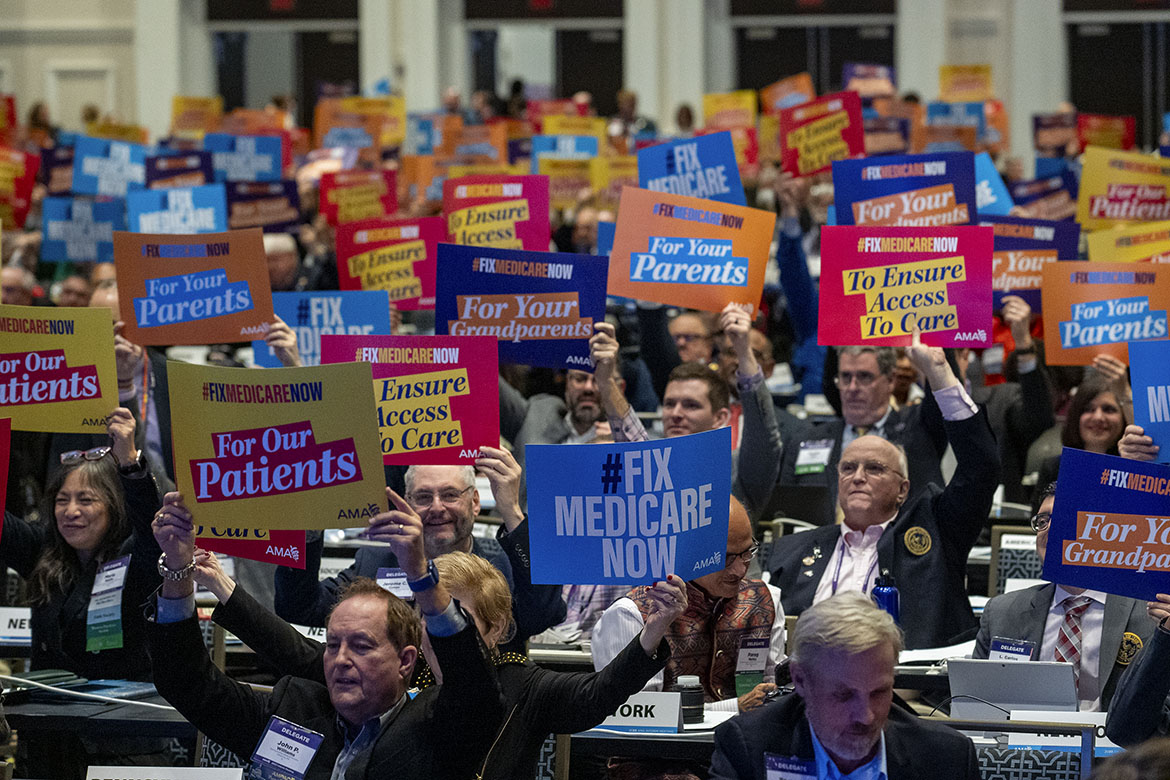Highlights from the 2023 AMA Interim Meeting
The 2023 Interim Meeting of the AMA House of Delegates covered a number of critical topics facing the nation’s health care system.
Medicare physician payment was a top priority for delegates—especially considering the 3.37% in payment cuts that, absent congressional intervention, are set to take effect in January. The House of Delegates adopted new policy to “continue to prioritize reforming the Medicare payment system to ensure the continued economic viability of medical practice”—with specific focus on stopping the 3.37% cut and achieving sustainable annual Medicare payment increases.
“When a system becomes so broken that, year after year, it places greater financial pressure on physicians—in fact penalizing them for providing care to Medicare patients —we cannot simply shrug our shoulders and ignore. The cuts are too deep, too relentless, and they touch too many lives—physicians and patients alike,” said AMA President Jesse M. Ehrenfeld, MD, MPH, in his speech to the House of Delegates.
The following are some of the other key issues that were discussed at the meeting:
- Prior authorization: Directed the AMA to advocate to ensure that only physicians who are trained, licensed and qualified to diagnose medical conditions or determine medical necessity perform prior authorization.
- Scope of practice: Reaffirmed existing policy to maintain the authority and oversight of state medical boards in the regulation nonphysician health professionals, and also reaffirmed policy on Truth in Advertising.
- Drug overdose epidemic: Called for elimination of dose limits on buprenorphine treatment for patients with opioid use disorder.
- Medical decision making: With the rise in health care administrator positions and physician employment, adopted policy to “continue to strongly oppose any encroachment of administrators upon the medical decision-making of attending physicians that is not in the best interest of patients.”
- National drug shortages: Adopted policy in support of diversifying drug manufacturing and supply chains and stabilizing the generic drug market, as well as in opposition to practices such as pharmacy benefit manager formulary restrictions.
- Network inadequacy: Adopted new policy to “support establishment and enforcement of a minimum network adequacy standard requiring all health plans to contract with sufficient numbers and types of physicians and other providers, including for mental health and substance use disorder, such that both scheduled and unscheduled care may be provided without unreasonable travel or delay.”
- Patient cost-sharing collection: Adopted policy to reduce the burden of cost-sharing on physicians by requiring health insurers to collect patient cost-sharing.
- Pluralism in health reform: Maintained opposition to single payer health reform.
For more information, view the complete day-to-day overview of meeting highlights.
More articles in this issue
- Nov. 17, 2023: Medicare Payment Reform Advocacy Update
- Nov. 17, 2023: National Advocacy Update
- Nov. 17, 2023: State Advocacy Update




